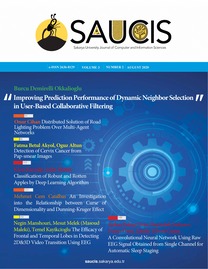Controlling of Virtual Mirror with Voice and Hand Motion
El Hareketleri ve Ses ile Sanal Ayna Kontrolü
___
[1] Weiyuan Liu, “Natural user interface- next mainstream product user interface,” in 2010 IEEE 11th International Conference on Computer-Aided Industrial Design & Conceptual Design 1, 2010, pp. 203–205.[2] K.-L. Kramer, User Experience in the Age of Sustainability. Science Direct, 2012.
[3] Y. El Miedany, Rheumatology Teaching. Springer.
[4] M. A. M. Echeverría, P. C. Santana-Mancilla, H. F. Q. Carrillo, and E. A. F. Enciso, “Natural User Interfaces to Teach Math on Higher Education,” Procedia - Soc. Behav. Sci., vol. 106, pp. 1883–1889, Dec. 2013.
[5] F. Cassola, L. Morgado, F. de Carvalho, H. Paredes, B. Fonseca, and P. Martins, “Online-Gym: A 3D Virtual Gymnasium Using Kinect Interaction,” Procedia Technol., vol. 13, pp. 130–138, 2014.
[6] H. Cho and N. Schwarz, “I like those glasses on you, but not in the mirror: Fluency, preference, and virtual mirrors,” J. Consum. Psychol., vol. 20, no. 4, pp. 471–475, Oct. 2010.
[7] P. Eisert, P. Fechteler, and J. Rurainsky, “3-D Tracking of shoes for Virtual Mirror applications,” in 2008 IEEE Conference on Computer Vision and Pattern Recognition, 2008, pp. 1–6.
[8] T. Blum, V. Kleeberger, C. Bichlmeier, and N. Navab, “mirracle: An augmented reality magic mirror system for anatomy education,” in 2012 IEEE Virtual Reality (VR), 2012, pp. 115–116.
[9] S. Casas, C. Portalés, L. Vera, and J. V. Riera, “Virtual and Augmented Reality Mirrors for Mental Health Treatment,” pp. 95–117.
[10] R. Nikam, C. Thete, S. Sonawane, S. Gadhave, and D. S. Thosar, “Virtual Shopping Using Kinect,” in National Level Conference On "Advanced Computing and Data Processing.
[11] J. Ishikiriyama and K. Suzuki, “An interactive virtual mirror to support makeup for visually impaired persons,” in 2017 IEEE International Conference on Systems, Man, and Cybernetics (SMC), 2017, pp. 1393–1398.
[12] G. Yolcu, S. Kazan, and C. Oz, “Real Time Virtual Mirror Using Kinect,” , Balkan Journal vol. 2, no. 2, 2014.
[13] G. Yolcu, C. Oz, and T. Tasci, “Developing and Establishing a Painting Program Controlled by Hand Motions Using Kinect,” 2Nd Int. Symp. Innov. Technol. Eng. Sci., pp. 1–7, 2014.
[14] M. R. Alam, "Isolated Speech Recognition System Based on Cross-Correlation Technique", ResearchGate, 09 September 2016.
[15] A. Suzen, “Home automation for disabilities using kinect technology,” Suleyman Demirel, 2012.
[16] P. Cottone, G. Maida, and M. Morana, “User Activity Recognition via Kinect in an Ambient Intelligence Scenario,” IERI Procedia, vol. 7, pp. 49–54, 2014.
[17] D. Tuvshinjargal, B. Dorj, and D. J. Lee, “Hybrid Motion Planning Method for Autonomous Robots Using Kinect Based Sensor Fusion and Virtual Plane Approach in Dynamic Environments,” J. Sensors, vol. 2015, pp. 1–13, 2015.
- ISSN: 2636-8129
- Yayın Aralığı: Yılda 3 Sayı
- Başlangıç: 2018
Controlling of Virtual Mirror with Voice and Hand Motion
Gozde YOLCU ÖZTEL, Serap KAZAN
Traffic Education for Inexperienced Drivers with Virtual Driving Simulator
Kaba Kuvvet Saldırı Tespiti ve Teknik Analizi
Simulation Modeling of An IoT Based Cold Chain Logistics Management System
Elektrik Yükünün Genetik Algoritma Temelli Holt-Winters Üstel Düzeltme Yönteminiyle Tahmini
Yunus Emre ÖZGER, Mustafa AKPINAR, Zabit MUSAYEV, Mustafa YAZ
